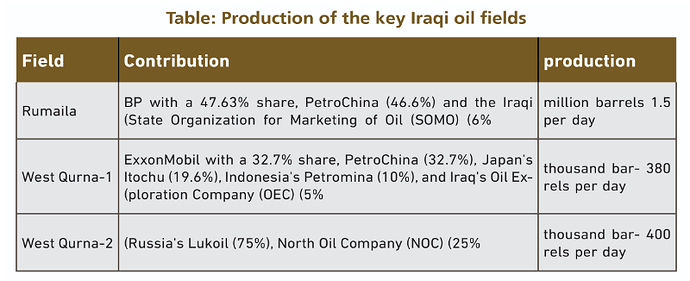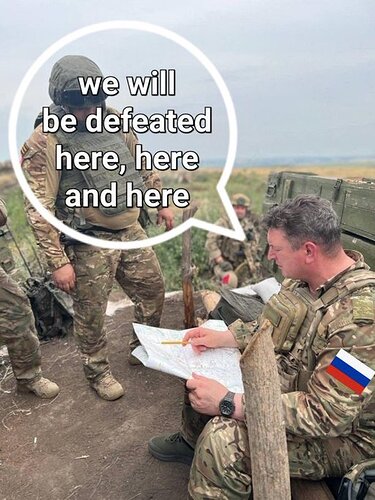Yes, I am. But I am trying to understand what makes sense from their perspective. A lot of analysis is either based on just giving up by concluding “it makes no sense” eg “Putin’s gone mad” or reaching for comfortable “common sense” explanations that have been widely agreed as applicable to previous wars.
The theory of “land grab, resources etc” still survives - mainly from US isolationists insisting the war is just a “territorial dispute”. But it simply doesn’t make much sense in the modern world.
If any Russian regime was deluded enough to think it did make sense, they could not possibly still think it does.
Yet the theory still lives on, along with others that directly contradict it such as the continuing belief that they expected a quick victory (which in fact is what Western analysts predicted - the Russian documents captured show that they were hoping to be engaged in “stablization operations” east of the Dnieper following a decapitation strike at Kyiv and advance from Donbas and along south coast and did not have a plan B for the forces deployed to Kyiv).
As Ukraine’s Armed Forces CinC Zaluzhniy said:
They wanted to take Kyiv. Militarily this was the right decision—the easiest way to achieve their goal. I would have done the same. I know Gerasimov [the head of Russia’s armed forces] well (not personally, of course). There was no way out for him. He concentrated on Donbas to preserve whatever resources he had left. As of today, the situation in Donbas is not easy. But strategically it is a no-win situation for the Russian army.
There is a vast difference between a failed operational tactic of attempting to take Kyiv quickly so as to make subsequent operations much easier against a disorganized enemy and the nearly unanimous “analysis” that they expected a quick victory (based on absolutely nothing more than the fact that they boasted of such expectations and Western analysts solemnly pontificated on the same lines).
Relying on surprise to take Kyiv could conceivably have worked, without any possibility of actually ending the war quickly. But commanders kept in the dark to preserve surprise could not prepare any plans and ended up having to retreat completely, not even able to surround and bombard Kyiv as part of the wider effort, which did continue in the Donbas and still does a year later.
Something makes sense to the regime about continuing the war, even though they now know they are fighting NATO, not just Ukraine, and were not expecting that.
The theories advanced to explain why they are doing so, whether based on delusions of imperial grandeur, grabing land and resources or just being “insane” simply do not explain why they don’t just give up now.
It is becoming increasingly accepted that Putin’s fate is tied to the war. To a much lesser extend the survival of the regime itself is coming into question. The recent Canadian Minister for Foreign Affairs statement was less unequivocal than the headlines:
Regime change in Moscow ‘definitely’ the goal, Joly says, as Canada bans Russian steel, aluminum imports
But such distorted headlines are themselves part of a changing public perception of what is necessary and possible. It looks like there is already a strong campaign in the USA to denounce the Biden administration as having a policy of regime change. It remains to be seen whether they will continue to insist they don’t or adapt to the fact that it is the only way the war can end.
It is of course conceivable that the regime once had different aims but is now fighting for survival.
But the main basis for other theories of why they launched this war is not that they intrinsically make sense but that they fit with preconceptions.
That is particularly obvious with preconceptions about “land grab, resources etc”.
The complete collapse of absurd official explanations of the Iraq war as a search for WMDs strongly reinforced the overwhelming consensus among the foreign policy establishment that the war was a really bad idea and a total failure because it destabilized the region. (My view was that it was a success because it destabilized a region that badly needed to be destabilized).
It also strongly reinforced prejudices among the majority of public opinion that the war was a grab for oil resources, despite the sheer absurdity of such theories (as evidenced by some links expounding them here).
An invasion to grab oil would install a “friendly” local administration dependent on the invaders that would agree to the necessary arrangements. In Iraq that would necessarily have meant some Baathist general from the dominant Sunni Arab minority. Instead the US appointed a temporary occupation administrator who did not even speak Arabic to make it utterly clear that they were not staying and the first two orders were to dissolve the Baath party and its armed forces.
Without them there was nobody who COULD assist with seizure of Iraq’s oil, Without the Baath party and its armed forces there was no option but to hold free elections as promised. No seizure of Iraq’s oil actually happened but the expected seizure remains vivid in the imaginations of people who “explained” the Iraq war to themselves on that basis and they still write articles about it (though mainly one has to look for articles from many years ago, when it was not so blindingly obvious who runs the Iraqi oil industry).
So at this stage of the conflict I am still expecting completely incoherent “common nonsense” theories to “explain” the war. But I expect the logic of the war itself to gradually make it as clear to the rest of the world as it is to Ukraine’s leadership that the existance of democracy in Ukraine is incompatible with autocracy in Russia.










